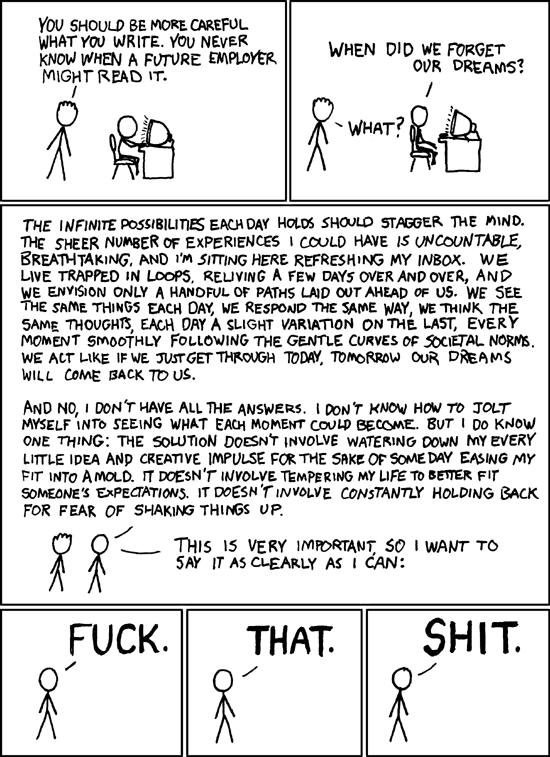I'm too lazy to look up the kind of detailed description of the debate that I imagine I'd find if I did a quick internet search, so do that yourself. Or trust my flawed recollection of it.
The initial question "Is a hot dog a sandwich" is used as a kind of prompt to encourage exercising critical thinking skills. There are a variety of interesting responses to the prompt and one ultimate, objectively correct answer, which I've never actually witnessed another human being provide. We'll come to that. But to set the stage, I need to recount the typical responses...
- One party might argue that a hot dog is not a sandwich because a sandwich consists of contents (such as meat) between two pieces of bread. A hot dog bun is a single piece of bread.
- Another party might argue that a hot dog is a sandwich because a sandwich consists of contents (such as meat) and bread to hold the contents in some way. Other items that are, by widespread consensus, known as sandwiches, use configurations other than the traditional two slices of bread with contents between them. A hot dog meets the same criteria as those sandwiches.
The average person knows intuitively that the affirmative side in the debate is wrong, so the affirmative side generally clings to a rigid framework of some hypothetical sandwich classification schematic. They stick to a point along the lines of "These other objects are all sandwiches and they have these properties in common, so another object with those properties (meat and other contents held inside bread) is, by definition, also a sandwich." Meanwhile, the negative side tends toward pithy ace-in-the-hole counterpoints. The most popular of these seem to be...
- Defining a hot dog as the sausage itself and insisting that no matter what the sausage + bun combination is classified as, the hot dog has no bread and is not a sandwich.
- Asserting that language exists to facilitate communication and that because most people do not think of hot dogs as sandwiches, it is improper to classify a hot dog as a sandwich.
The problem is that the negative side in the debate, the "not a sandwich" camp, are right, but seem to be unable to articulate the real reason that a hot dog is not a sandwich. So I, in all my splendorous wisdom, am here to tell you the right reasons that the "hotdog is a sandwich" camp is wrong.
There's a hint. Earlier in this post I noted that the argument for the affirmative side hinges on invoking a taxonomic classification scheme. They want to rigorously define different categories of food. Although they do not normally need to go so far as to construct diagrams, they're clearly drawing inspiration from existing systems of classifications used professionally by experts in other fields, such as engineering and biology. They create, or refer to the hypothetical creation of, a systematic approach to defining foods in different categories, as though the foods are machine parts or flowering plants. Then the word "sandwich" is matched to objects already established to have the name and the list of properties associated with the label are deduced from the features those objects have in common. Those arguing for the affirmative are acting as detectives trying to map out the logic to determine what is and is not a sandwich. The huge, gaping flaw in all of this is that there's already an established professional classification scheme for food and it is based on food preparation. The names assigned for food are assigned by food creators, by chefs. We know where the names come from. They are not assigned post-hoc by investigators endeavoring to establish a classification scheme. They come from chefs.
The origins of the term "hot dog" are unclear and it is used inconsistently, sometimes applied to sausage alone and other times applied to the sausage + bun combination. The former is older, which might matter if that was the topic of the debate. But the relevant part is that hot dogs have been around for well over a century and that they were not marketed as or thought of as sandwiches because the history of their creation is different. In a meat sandwich, the emphasis is on placing the meat and other ingredients on or into the bread. Keep in mind that the term is a culinary term, so we're concerned with food preparation here. In evaluating a culinary term, it makes no sense to step outside of the culinary realm and act like we're space aliens observing the object with no prior information. The term is a culinary term, so the preparation of the object as food is the impetus for the term used to describe the object. And while lots of sandwiches have their own steps involved, the unifying element is the placement of contents on or into bread. A hot dog isn't like that. It is created in a factory or sausage shop, then packed and shipped to a food vendor. It is then unpacked, cooked, and added to a bun. Then toppings and condiments, aka "fixings" are added and the combined product is sold and consumed as a "hot dog." It is definitely true that applying the same label to the initial sausage and to the finished product is muddled and is not the way we'd want to do things if we were establishing a taxonomic system from scratch. But that's how it goes! The term demonstrably gets applied, widely, to both. That's the culinary usage. The traditions and the emphases in the two culinary traditions are distinct. To dismiss this is folly.
Q.E.D.


